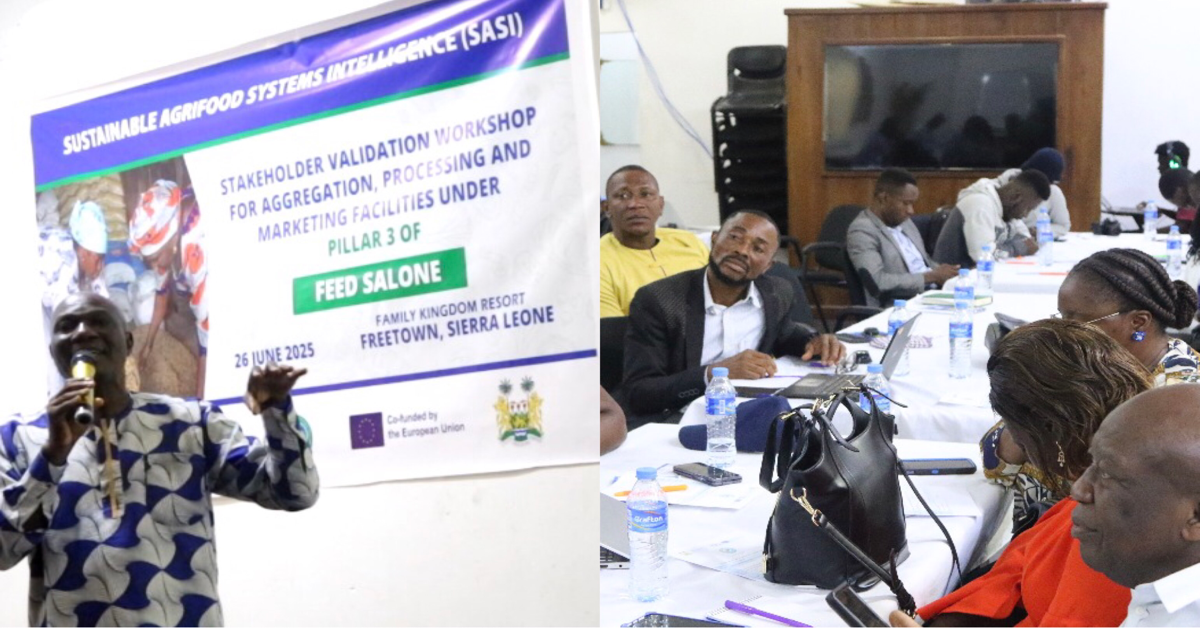On Thursday, June 27, 2025, the Sierra Leone Chamber for Agribusiness Development (SLeCAD) hosted a pivotal event titled “Stakeholders Validation Workshop for Feed Salone Pillar 3: Aggregation, Processing, and Marketing.” The workshop commenced with opening remarks from SLeCAD’s CEO, Ahmed Nanah, who emphasized several key aspects essential for the effective moderation of the event.
Nanah highlighted the collaborative efforts between SLeCAD, the European Union, and the Food and Agriculture Organization (FAO) in developing comprehensive documentation to support the initiative. He underscored the critical role of public-private partnerships, articulating the significant benefits they can bring to the agribusiness sector.
Furthermore, Nanah stressed the importance of government involvement in the proposed model, which is designed to generate numerous job opportunities within the agribusiness sector and beyond. He noted that SLeCAD operates as a consortium and has established a framework that leverages the expertise of professionals with extensive experience in both governmental and agribusiness sectors. He pointed out that successfully advancing agriculture requires a holistic approach that encompasses not only production but also marketing and trade linkages, which are vital for the sector’s growth.
A representative from the FAO elaborated on the necessary studies and strategies to ensure agricultural success in the country. In his remarks, he commended the consortium for its exemplary work and acknowledged the importance of his presence in supporting this initiative. He shared that while the initial approach considered individual consultancy, he advocated for a collaborative effort that would bring together diverse expertise for this critical study. His recommendation was well-received and yielded positive results.
The FAO representative further explained that the initiative originated from the UN Food Systems Summit, which aimed to create a framework for transforming food systems. He praised the resulting documentation for its comprehensive perspective on agriculture, emphasizing the importance of viewing the sector through an agricultural lens.
This workshop marks a significant step forward in enhancing the agribusiness landscape.
Federico Capurro, the Program Manager for the European Union, articulated that his attendance at the event was motivated by three primary objectives rather than mere obligation. Firstly, he aimed to celebrate the achievements of the Sustainable Agri-food System Intelligence (SASI) initiative, which is funded by the European Union. He emphasized that this program is a key component of the EU’s Global Gateway strategy, which allocates €150 billion towards infrastructure, energy, and food systems across Africa.
Capurro highlighted that Sierra Leone is a participant in the SASI pilot project, benefiting from a robust technical assistance partnership with the Food and Agriculture Organization (FAO). He expressed gratitude to the FAO for its support in implementing Pillar 3 of the Feed Salone initiative. In February, they presented the implementation plan for Pillar 3 to the Ministry of Agriculture, noting that while presenting a plan signifies the establishment of a strategy, effective execution is crucial for success. The purpose of this meeting was to showcase the initial results stemming from the diligent implementation of Pillar 3.
Madam Jeneba Alharazim, the Acting Director of Agribusiness and Private Sector at the Ministry of Agriculture and Food Security, elaborated on her role at the event. She was present to validate a document assessing facilities in various districts related to aggregation, processing, and marketing. She further explained that the study would establish parameters that would guide efforts to enhance aggregation, processing, and marketing strategies aimed at both local and international markets.
In the presentation of Outputs One and Two of the Baseline Report, Chief Executive Officer Ahmed Nanah emphasized the report’s significance for both investors and farmers. He highlighted that Output One provides banks with the opportunity to invest in agribusiness, particularly in light of government initiatives and support from the European Union. He categorized these forms of assistance under the framework of Public-Private Partnerships (PPP), underscoring the government’s role in facilitating such contributions. He noted that these funds represent vital PPP support.
The report examines optimal strategies for allocating these resources, assessing their contributions, and identifying more effective ways for the government to provide support to ensure maximum outcomes. Nanah stated that Output One consolidates various approaches for investment banks and government agencies to enhance agribusiness within the country.
Regarding Output Two, Nanah discussed the baseline narrative, revealing that the government has allocated substantial funds through its partners. He cited consultations with over 193 Agricultural Business Centers (ABCs), which aim to transform these entities into farm gate industries that produce raw materials and bolster local agribusinesses. This, in turn, adds value and ensures a steady supply to the market. While he acknowledged that these structures have existed, he pointed out that they have not been maintained to the expected standards.
Additionally, he mentioned other initiatives supported by various projects and private sector banks, such as Sierra Bo Garri and Mountain Lion. The report seeks to analyze these efforts, addressing critical questions regarding their functionality: Why are some initiatives thriving while others are not? What factors contribute to their success or failure? Nanah concluded that the report is focused on exploring these areas to provide actionable insights.











